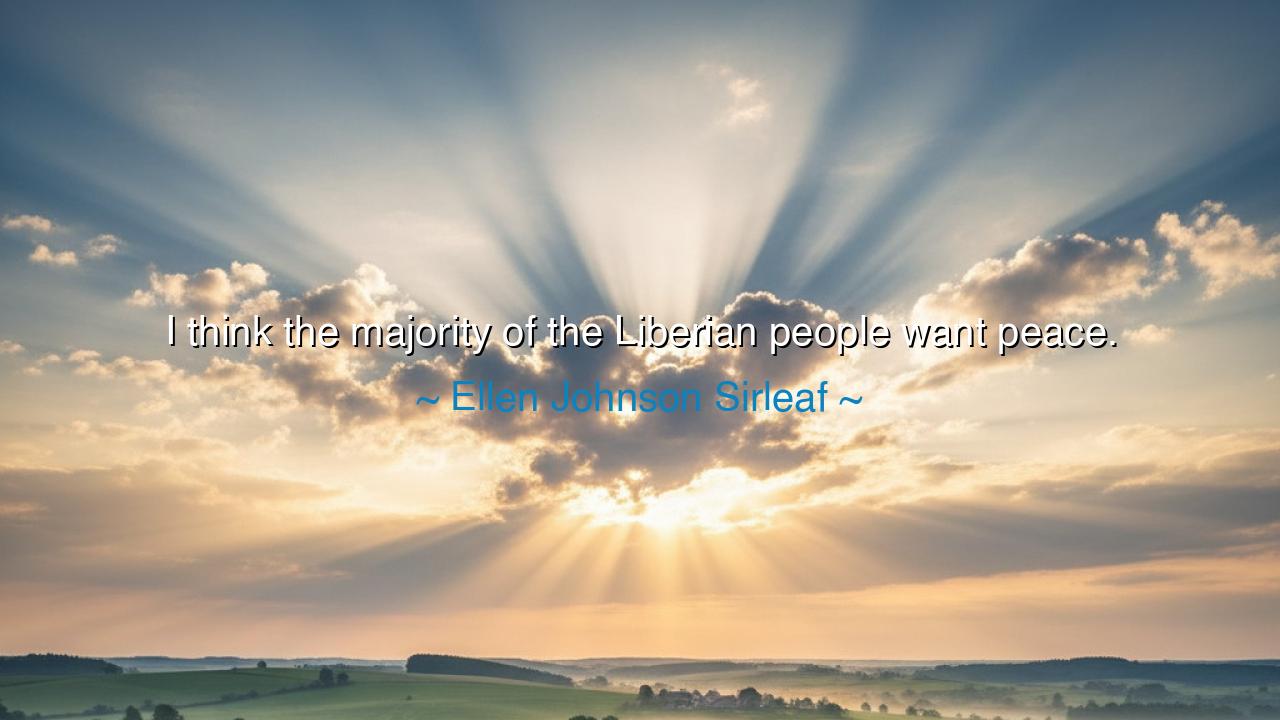
I think the majority of the Liberian people want peace.






“I think the majority of the Liberian people want peace.” Thus spoke Ellen Johnson Sirleaf, the first elected female head of state in Africa, a woman who bore the weight of a nation scarred by civil war. In her words is the cry of a people long torn apart, yet still yearning for healing. It is the reminder that even when warlords thirst for power, even when violence seems to dominate the land, the heart of the ordinary citizen beats not for bloodshed but for peace.
The meaning of her words lies in the eternal distinction between rulers and the ruled, between the ambitions of the few and the needs of the many. In Liberia, as in all nations racked by war, the people themselves—the mothers, the farmers, the children—did not hunger for battle. They hungered for stability, for safety, for the chance to live and grow. Sirleaf, rising from the ashes of Liberia’s long and bitter conflicts, gave voice to this truth: the majority of the people want peace, even when war seems to hold them captive.
The origin of this truth lies in the tragedy of Liberia’s civil wars, which lasted from 1989 to 2003, tearing the nation apart with massacres, displacement, and famine. Warlords and militias fought for power, while civilians paid the price. Yet amid this darkness arose movements like the Women of Liberia Mass Action for Peace, led by Leymah Gbowee, where thousands of women—Christians and Muslims together—demanded an end to violence. They sat, prayed, and protested until negotiations began. This living example revealed what Sirleaf later affirmed: that while the few sought war, the many sought peace.
The ancients too bore witness to this truth. When Pericles led Athens into the Peloponnesian War, it was not the people in their homes who longed for battle, but the leaders and strategists. The common folk of every age—those who till the earth, raise their children, and labor in ordinary ways—have always longed for peace. History is too often written by the ambitions of rulers, yet beneath it lies the silent testimony of the people, whose truest desire is stability and life, not conquest.
When Ellen Johnson Sirleaf took office in 2006, inheriting a broken nation, she faced the immense challenge of rebuilding. She sought not revenge but reconciliation, understanding that the majority of Liberians wanted peace more than anything else. Her leadership, coupled with the movements of ordinary citizens, allowed Liberia to step out of endless cycles of violence and begin the slow work of reconstruction. Her words were not speculation, but observation born of lived truth: the people themselves, weary of blood, carried the will for healing.
The lesson for us is profound: never mistake the ambitions of the few for the desires of the many. Warlords, politicians, and tyrants may seek war, but the people—the majority—seek peace. In our own lives, too, we must remember that the human heart does not thrive on conflict. Families, communities, and nations flourish not through conquest but through reconciliation. The strength of a people lies in their shared longing for peace, even when chaos surrounds them.
Therefore, children of tomorrow, remember Ellen Johnson Sirleaf’s wisdom: honor the will of the many, not the greed of the few. If you are ever given power, use it to build, not destroy; to heal, not divide. And in your own daily life, choose peace—be the one who reconciles, who forgives, who builds bridges rather than walls. For though history is scarred by violence, the destiny of humanity is not war but peace. And it is peace, chosen by the many and guarded by the brave, that will endure when the fires of conflict have long burned out.






TLThu Le
Ellen Johnson Sirleaf's quote seems to speak to a deep yearning for peace, but is peace always achievable when there are so many historical wounds to heal? After years of civil war, how does Liberia move from the desire for peace to actually achieving it? What role do reconciliation, justice, and nation-building play in making sure that peace is sustainable and that everyone feels part of the process?
GDGold D.dragon
I agree with Ellen Johnson Sirleaf's perspective that the majority of Liberians want peace, but it raises a question: is this desire for peace shared equally across all communities and sectors? What about the groups that may feel marginalized or left behind in the peace process? How can we ensure that peace doesn’t only benefit a select few, but is truly inclusive for all Liberians, regardless of their background or region?
VLLuu Van Loc
It’s clear from Ellen Johnson Sirleaf's words that peace is something that the majority of Liberians yearn for, but how do we ensure that this peace is long-lasting? In post-conflict societies, is it enough to simply desire peace, or do deeper structural changes need to take place? How do we address the underlying issues that might lead to future conflict, even if the people want peace?
THDinh Thi Hoa
Ellen Johnson Sirleaf’s statement about the majority of Liberians wanting peace feels like a hopeful and positive reflection of the people’s desires. But I wonder, how do we define peace in a country that has experienced so much turmoil and conflict? Is it just the absence of war, or does it encompass economic stability, social justice, and opportunities for all? What steps should be taken to make peace a reality for everyone?